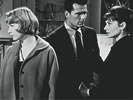Eye For Film >> Movies >> The Children's Hour (1961) Film Review
As the fifth Glasgow Film Festival's retrospective has demonstrated, there are a lot of Audrey Hepburn fans out there. She's much loved for films like Funny Face and Breakfast At Tiffany's, yet she always wanted to take on meatier roles and show that she could do more than be charming and cute. In The Children's Hour she found one of the meatiest roles of her career. It's ironic, then, that this film, nominated for several Oscars in its day, is now so little known. However, its social impact continues to resonate today.
Hepburn plays Karen, a young teacher at a rural school for girls who works alongside Martha, a friend she has known since college (played by the equally wonderful Shirley MacLaine). She has a boyfriend (James Garner), a doctor who plans to marry her, and Martha clearly feels uncomfortable about this, but otherwise their lives are idyllic - they're finally in the black and their business looks set to prosper, plus they both clearly love their jobs.

The children they teach, however, are not all so content. In particular, young Mary, petulant and prone to tantrums, longs for her beloved grandmother to take her away. Chancing upon malicious words between frustrated adults, and witnessing a chaste, affectionate kiss, she concocts an allegation that adults are all too happy to accept and infer from. When word goes round that Karen and Martha are lesbians, horrified parents frantically pull their children out of the school, which collapses almost overnight.
So far, so disastrous. The women do what they can to fight the allegations and to stand up to the prejudice they encounter, supported by Karen's boyfriend. But the trouble is, Martha really is in love with Karen, and the situation forces her to confront aspects of her feelings - and her own identity - that she has no idea how to deal with.
Released in the same years as Victim, The Children's Hour never quite achieved the same iconic status (cynics will argue that the lesbian rights movement has always been the poor relation of gay men's campaigns), but it nevertheless had a profound impact on viewers when it was released. It wasn't new, being a remake of an earlier film by the same director which he had felt less able to speak freely with, and that in turn was based on a successful Broadway play, but it was a revelation to the millions of ordinary people who had little contact with the theatre. Forging its way into the mainstream thanks to its famous stars, it was one of the first films to present a lesbian as an ordinary person who might experience life and love like anyone else.
Though it looks dated in some ways now, with its lapses into melodrama problematic in places, The Children's Hour has strong characters whom modern audiences will have no difficulty relating to, and, sadly, its plot remains highly relevant - 25 per cent of people in a recent Scottish survey said that they felt lesbians were unsuitable to be primary school teachers. Watching it at this point in time, as well as providing a moving experience in itself, provides an opportunity to take stock and see where things have improved and where they haven't, and to ask ourselves why we're still so obsessed with people's private behaviour.
Reviewed on: 17 Feb 2009


















